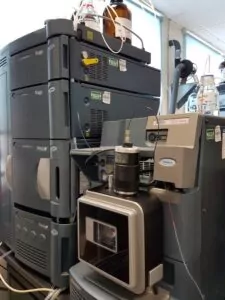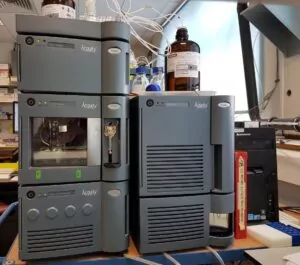Reducing the Frequency of Service Engineer Visits for LC-MS Maintenance to Annual Events

For King’s Liver Laboratories, infrequent instrument service is a reality thanks to their 13-year partnership with Waters

Labs like King’s Liver Laboratories in London need to analyze thousands of samples with fast turnaround times, so it’s critical to have reliable LC-MS/MS instrumentation that works every day and provides accurate and precise results.
To achieve this, it’s helpful if the laboratory has a good long-term relationship with an instrument provider. King’s Liver Laboratories benefits from such a relationship with Waters.
As part of the Institute of Liver Studies at King’s College Hospital, the facility processes about 23,000 diagnostic tests per year using a variety of analytical techniques, including tandem quadrupole mass spectrometers for Immunosuppressive Drug Monitoring (IDM) services. They have used three generations of Waters MS products and are currently using ACQUITY TQD, Xevo TQD, and Xevo TQ-S micro systems.
The Xevo TQ-S micro has been particularly important to the lab thanks to its increased sensitivity, which allows access to lower analyte concentrations and alternative sample matrices.
Describing how the reliability and robustness of Waters instruments meets their needs, Dr. Phillip Morgan, who leads the IDM service, said, “In practice, the instruments are used virtually all day during busy times, with injections of crudely prepared (protein-precipitated) whole blood. With one or two exceptions the only time they see an engineer is for the annual performance maintenance service.”
Typical turnaround times for samples submitted for IDM are 24 hours – so it is easy to see why any downtime can significantly impact this laboratory’s success.
“… The only time they see an engineer is for the annual performance maintenance service.”
The more the merrier
In fact, being able to ensure continuous results turnaround is so important that King’s Liver Laboratories have invested in multiple instruments.
As Dr. Morgan described, “We are lucky to have three instruments that can be used interchangeably so we can cope for a while if an instrument becomes unusable. If two go down then it causes serious issues, thankfully this situation has not arisen.”

As explained in Fionn Quinlan’s previous blog post on therapeutic drug monitoring, LC-MS/MS is a more specific test than immunoassay and so is less likely to result in over-reporting of drug concentrations in samples, particularly when metabolites, which are resolved by MS but not by immunoassay, may be present at similar levels to the parent drug.
The increased usage of LC-MS/MS in clinical laboratories worldwide means that this cutting edge technology will improve healthcare for many more people in the future.
Popular Topics
ACQUITY QDa (16) bioanalysis (11) biologics (14) biopharma (26) biopharmaceutical (36) biosimilars (11) biotherapeutics (16) case study (16) chromatography (14) data integrity (21) food analysis (12) HPLC (15) LC-MS (21) liquid chromatography (LC) (19) mass detection (15) mass spectrometry (MS) (54) method development (13) STEM (12)


